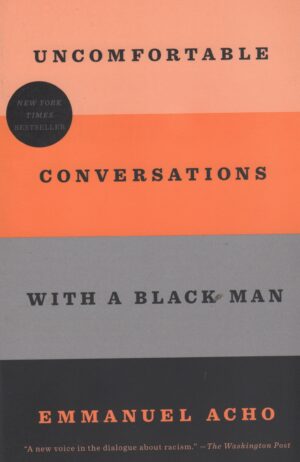
Uncomfortable Conversations with a Black Man by Emmanuel Acho (2020. Flatiron. ISBN 978-1-250-80047-3)
Like President Barack Hussein Obama, the author of this reflection on race relations in the United States is the son of immigrant Blacks, not a descendent of slaves. In the beginning of the book. Acho ponders what this meant for him as a Black kid growing up in Texas and how his upbringing, by two college-educated parents who immigrated from Africa, was similar and/or different from those of other Black children he attended school with, played sports with, and ultimately, engaged in life after pro sports with.
Acho gives all of us white folks a basic understanding of the Black experience in America, tracing institutional, personal, and systemic racism to its roots in enslavement while trying, as best as he can, to instill in his audience why the bitter ravages of chattel slavery still haunt his community and in fact, all of modern American life.
Each chapter tackles an issue/problem that the author perceives needs addressing so that white readers can begin to understand. The slender chapters include an introductory narrative, continue with a section entitled “Let’s Rewind” (giving us the history behind what’s being discussed), followed by a dissertation that’s meant to challenge the reader (“Let’s Get Uncomfortable”, and end with a call for action (“Talk It, Walk It”). The format makes it a perfect learning tool for classrooms, book clubs, and political discourse.
For example, the first question addressed is “What Should I Call a Person of Color (POC)?”. Well, here’s a bit about that:
Black covers the descendants of the people who were brought over on slave ships and forced to work on plantations and also includes people like my parents, who immigrated to the United States. It covers all black people in the United States and joins them with people of African descent in Brazil, the Caribbean, Mexico (the diaspora), and other countries where the transatlantic slave trade brought Africans. It’s a descriptor of what black people had in common.
But it isn’t that simple. Just because the author prefers the demarcation, “black” (he, for whatever reason, doesn’t follow modern writing style and capitalize the word), doesn’t mean every BPOC (black person of color) is comfortable with the term. Some still prefer “African American.” Hence, his advice on the topic:
There’s no one label that will satisfy all (who knows, maybe there’s some old head who wants to be called “Negro”), but there is usually an opportunity to ask someone their preference.
Pretty sage advice, that. Ask. The book is filled with such common sense advice for white readers, including how to become an ally in the fight against racism. I found the book a great tutorial; a starting point for learning how to have uncomfortable, and maybe, just maybe, comfortable discussions with black folks about race.
4 stars out of 5. A little too short to achieve a 5 star rating but a fine effort.
Peace
Mark


